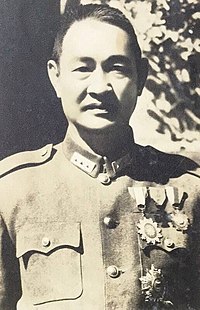
Back تشنغ تشيان Arabic Čcheng Čchien Czech Cheng Qian French 程潜 Japanese Cheng Qian JV Trình Tiềm Vietnamese 程潛 Chinese
Cheng Qian | |
|---|---|
程潛 | |
 Cheng Qian | |
| Governor of Hunan | |
| In office 1948–1949 | |
| Chairman | Mao Zedong |
| Preceded by | Wang Dongyuan |
| Succeeded by | Chen Mingren |
| In office 1952–1967 | |
| Preceded by | Wang Shoudao |
| Succeeded by | Li Yuan |
| Personal details | |
| Born | March 31, 1882 Liling, Hunan, Qing dynasty, China |
| Died | April 5, 1968 (aged 86) Beijing, People's Republic of China |
| Political party | Chinese Communist Party |
| Awards | Order of Blue Sky and White Sun Order of the Sacred Tripod |
| Military service | |
| Allegiance | |
| Rank | |
Cheng Qian (simplified Chinese: 程潜; traditional Chinese: 程潛; pinyin: Chéng Qián; Wade–Giles: Ch'eng Ch'ien; 31 March 1882 – 5 April 1968) was a Chinese army officer and politician who held important military and political positions in both the Republic of China and the People's Republic of China.[1][2] Educated at the Imperial Japanese Army Academy and Waseda University, he first met Sun Yat-sen in Tokyo, becoming an early supporter. Later, under Chiang Kai-shek, he was one of the most powerful members of the Kuomintang, notably serving as Chief of Staff of the Military Affairs Commission during the Second Sino–Japanese War.
In August 1949, as Governor of Hunan, he peacefully surrendered to Mao Zedong's advancing Communist forces, joined the Revolutionary Committee of the Kuomintang and, after the founding of the People's Republic of China, went on to serve as Vice Chairman of the Central Military Commission (1949–1968), Governor of Hunan (1952–1967) and Vice Chairman of the National People's Congress (1954–1968), among other posts.[1][2]